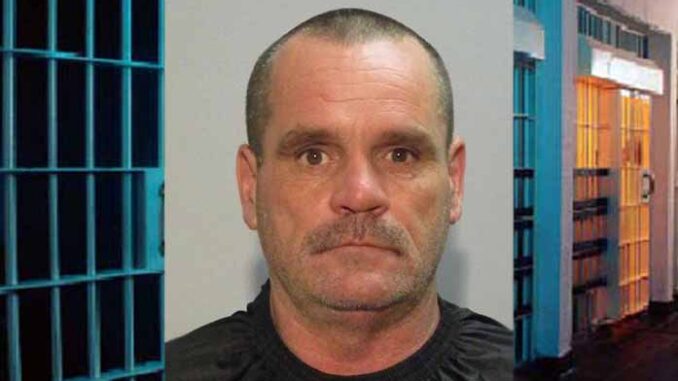
The Sierra Vista man identified in court documents in 2019 as the ringleader of a group of drug dealers in Cochise and Pima counties will remain in state prison after the Arizona Court of Appeals refused to review his petition for post-conviction relief.
Timothy Francis Henry is set to be released from custody in December 2031 after pleading guilty in 2020 to two felonies: transportation of a narcotic (heroin) drug for sale and weapons misconduct. The DEA considered his methamphetamine and heroin operation so prolific that it was called the Timothy Henry Transnational Criminal Organization.
Henry, now 52, cannot appeal his convictions or 14-year sentence because he signed a plea agreement giving up the right of appeal. Instead, he filed a petition for post-conviction relief, asking the Cochise County judge who imposed sentence to review the quality of legal representation Henry received leading up his guilty pleas.
That judge dismissed Henry’s petition this summer, and on Nov. 1 the Court of Appeals unanimously denied a petition filed by Henry’s new court-appointed attorneys to review their arguments for post-conviction relief.
Court records show those arguments included several allegations of ineffective assistance against Henry’s original attorney, including failure of the attorney to challenge venue given that at least one of the heroin sale charges likely took place in Pima County, not Cochise County.
The petition for post-conviction relief also alleges there was no factual element presented to the court showing that transportation of heroin took place in Cochise County, and that Henry’s attorney failed to request a sentencing mitigation hearing and failed to provide an accurate factual basis for the charges during a change of plea hearing.
According to Henry’s petition, because Cochise County did not have venue over the transportation for sale charge, the court therefore lacked jurisdiction to convict and sentence him. All of Henry’s arguments were rejected by the lower court in September.
In the Court of Appeals’ decision denying review, Chief Judge Garye Vasquez points to issues with the work of Henry’s new attorneys. One of those issues involves an affidavit provided by Henry’s original lawyer who admitted not discussing the venue issue with Henry.
That might be true, Vasquez noted, but “Henry notably did not include an affidavit on his own behalf stating he would not have pled guilty if counsel had been able to get the drug count dismissed on venue grounds.”
But there were other deficiencies with the filing to the court of appeals, Vasquez noted.
“Although Henry has filed what purports to be a petition for review of the trial court’s ruling, it is essentially a verbatim copy of his petition for post-conviction relief, albeit with some changes made to the title and signature pages and some minor changes to some of the headings,” Vasquez wrote. “Notably, in his petition for review, Henry does not refer to the court’s ruling below, nor does he explain why he believes the court improperly dismissed his petition, much less explain how it abused its discretion by doing so.”
The failure to comply with court rules related to petitions for post-conviction relief “justifies our refusal to grant review…Accordingly, we deny review,” Vasquez noted.
Court documents show a multi-agency DEA taskforce became interested in Henry’s activities in 2017 after cellphone records belonging to several low-level drug dealers pointed to him as a source of meth and heroin being sold in Cochise County. Authorities installed a surveillance camera on a pole near Henry’s residence on the eastside of Sierra Vista, allowing investigators to record activity in and out of Henry’s property.
In March 2018, an undercover agent spoke with Henry and arranged to buy $3,000 of meth. Then in August 2018, a known associate of Henry’s was arrested after fleeing from a Cochise County Sheriff’s deputy during a traffic stop.
During the incident, someone in the vehicle threw a package of drugs out of the vehicle. When the driver bonded out of jail, he contacted Henry, who investigators said had a financial interest in the drugs. Several text messages were exchanged about trying to locate the drugs, and at one point a warrant was issued to allow detectives to utilize a cell phone tracking program which placed Henry’s phone in the area of the traffic stop when some of the text messages were sent.
Also in 2018, investigators learned via wiretaps that Henry was trying to purchase a pound of brown tar heroin from someone in Sahuarita. Henry was kept under surveillance anytime he drove to Pima County, and detectives used high-powered binoculars and spotting scopes to monitor a rural property in Sahuarita connected to the person Henry was talking with.
Eventually the investigation was expanded to include a dozen Pima County residents, on top of the dozen or so Cochise County suspects.
On Jan. 9, 2019, Cochise County Sheriff Mark Dannels and then-Pima County Sheriff Mark Napier announced the arrest of Henry and 19 other people. The announcement was made during a rare joint press conference which featured a display of seized drugs, currency, and numerous firearms.
The mass arrests prompted the Arizona Attorney General’s Office to initiate forfeiture claims against more than $802,000 in assets seized during the two-year investigation. At least two homes were included in the forfeiture efforts, along with nearly 60 vehicles.
Henry was eventually able to post a $150,000 bond and get out of jail pending resolution of his case. He also obtained a waiver from the attorney general’s office granting him access to $32,500 seized from Henry’s financial accounts. Court records show the funds were released for the sole purpose of paying Tucson-based criminal defense attorney Christopher Scileppi.

